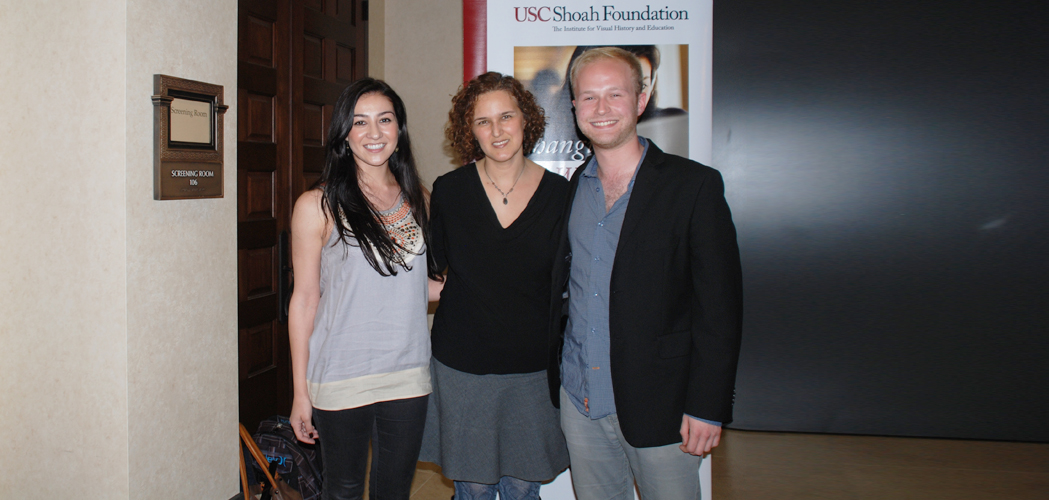Students and Jury Discuss Winning Films at Student Voices Award Ceremony

The Student Voices Short Film Contest concluded Thursday night with the presentation of the jury and viewer’s choice awards to the finalists and their films.
The winners of Student Voices 2014 were Syuzanna Petrosyan and Greg Irwin for their film Play for Your Life. Shirin Raban’s There is No Other Way received the viewer’s choice award, based on the public’s voting on the USC Shoah Foundation website. Rebecca Baugh’s Love, Noemi received an honorable mention.
The jury included USC’s Michael Renov and Holly Willis, vice dean of academic affairs of the School of Cinematic Arts (SCA) and director of academic programs at the Institute for Multimedia Literacy, respectively; independent filmmakers Eric Kabera and Sam Kadi; and the 2013 Student Voices winner, Cecilia De Jesus.
Kadi began the evening by presenting a clip from his documentary Veto, about the current conflict in Syria. He said that today, even after declaring that an event like the Holocaust would never happen again, we live in “extreme circumstances,” in which “the right to life is becoming a luxury in some places.”
“Humanity has once again failed to stop civilians from being massacred on a massive scale,” Kadi said of Syria. “What’s the magic number for their deaths to be considered a genocide?”
However, Kadi said he sees hope thanks in part to organizations like the USC Shoah Foundation, which gives victims around the world a voice. He said that some of the most influential people in the world are filmmakers.
“Their cameras can force a revolution and force peace talks exposing dictators and tyrants,” Kadi said. “Films can touch the human heart and impact them at the highest level.”
“Films can’t change the world,” he added, “but people who watch them can.”
Raban, Petrosyan and Irwin then introduced their films. Raban said she felt a connection to Naumi Alcalay, the subject of her film, because she had also experienced an “exodus” of her own, from Iran to Pakistan, when she was young. Petrosyan and Irwin dedicated their film to the late Holocaust survivor Alice Herz-Somner, the subject of the Academy Award-winning documentary The Lady in Number 6: Music Saved My Life that inspired them to explore the topic of music in concentration camps.
After the screening, Renov began a panel discussion with the three winners by asking Raban to explain the artwork in her film. Raban said the quick sketches over photos of textures she found around her (untidy) house represented Alcalay’s “distraught” experience of being forced to leave her home quickly – and the fact that Raban had been working so hard on her film that she hadn’t had time to wash the dishes.
Renov asked the students how Student Voices relates to their studies at USC.
Petrosyan said her interest in interning for the USC Shoah Foundation and entering Student Voices comes from her own Armenian background and interest in learning more about the Armenian Genocide. As a public diplomacy master’s candidate, she said, she’s used to studying big international issues, but she feels it’s important to understand how “smaller, personal” stories relate to the big picture.
Raban said that her field, graphic design, is a kind of storytelling in itself. Design tells the story of a product or brand while filmmaking tells the story of people and cultures, and both must stay true to what their subjects have to say. “We’re just the facilitators here,” Raban said.
Kabera told the students that they should be prepared for the impact that filmmaking about genocide could have on them if they choose to pursue it as a career path. It can be traumatic, he said. Kadi agreed but added, “Somebody has to do it. We have to do it.”
Willis asked the students what they would each say to others to get them to participate in Student Voices. Irwin said that some students, himself included, feel intimidated by the subject of genocide and may not be confident that they are the right person to tell the story.
“But I’m very glad I did,” Irwin said. “I felt so much attachment to the material and to Alice [Herz-Somner]. All her words are burned into my mind and I feel like I could recite them from memory.”
Raban and Petrosyan also remarked how close they felt to the survivors portrayed in their films after spending so much time watching their testimony. Rabin said Alcalay now feels like a grandmother to her.
“I feel like if I saw [Herz-Somner] on the street I should hug her and we should be old friends,” Petrosyan said.